As per chronological birthday
Chhatrapati Shivaji Maharaj
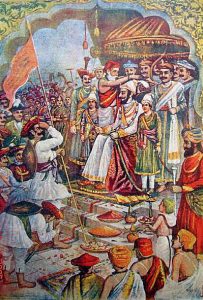
Chhatrapati Shivaji Maharaj
(19 February 1630 – 3 April 1680)
On the 13th day (trayodashi) of the first fortnight of the month of Jyeshtha in the year 1596 (English Calender: 6 June 1674) Chhatrapati Shivaji Maharaj was crowned as the Chhatrapati (Monarch) of his realm at Raigad. Shivaji established a competent and progressive civil rule with the help of a disciplined military and well-structured administrative organisations.
Shivaji’s sentiments of inclusive and tolerance of other religions can be seen in an admonishing letter to Aurangzeb, in which he wrote: Verily, Islam and Hinduism are terms of contrast. They are used by the true Divine Painter for blending the colours and filling in the outlines. If it is a mosque, the call to prayer is chanted in remembrance of Him. If it is a temple, the bells are rung in yearning for Him alone.
Rishi Bankim Chandra Chattopadhyay
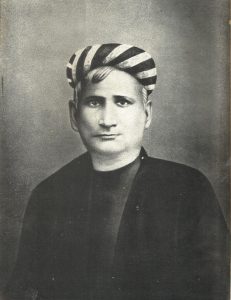
Rishi Bankim Chandra Chattopadhyay
(27 June 1838 – 8 April 1894)
Rishi Bankim Chandra Chattopadhyay was the composer of Vande Mataram. “Vande Mataram” was the whole nation’s thought and motto for independence.
বন্দে মাতরম্৷
সুজলাং সুফলাং
মলয়জশীতলাম্
শস্যশ্যামলাং
মাতরম্!
শুভ্র-জ্যোত্স্না-পুলকিত-যামিনীম্
ফুল্লকুসুমিত-দ্রুমদলশোভিনীম্,
সুহাসিনীং সুমধুরভাষিণীম্
সুখদাং বরদাং মাতরম্৷৷
সপ্তকোটীকন্ঠ-কল-কল-নিনাদকরালে,
দ্বিসপ্তকোটীভুজৈধৃতখরকরবালে,
অবলা কেন মা এত বলে!
বহুবলধারিণীং
নমামি তরিণীং
রিপুদলবারিণীং
মাতরম্৷
তুমি বিদ্যা তুমি ধর্ম্ম
তুমি হৃদি তুমি মর্ম্ম
ত্বং হি প্রাণাঃ শরীরে৷
বাহুতে তুমি মা শক্তি,
হৃদয়ে তুমি মা ভক্তি,
তোমারই প্রতিমা গড়ি মন্দিরে মন্দিরে৷
ত্বং হি দুর্গা দশপ্রহরণধারিণী
কমলা কমল-দলবিহারিণী
বাণী বিদ্যাদায়িণী
নমামি ত্বাং
নমামি কমলাম্
অমলাং অতুলাম্,
সুজলাং সুফলাং
মাতরম্
বন্দে মাতরম্
শ্যামলাং সরলাং
সুস্মিতাং ভূষিতাম্
ধরণীং ভরণীম্
মাতরম্৷
Kobi Guru Rabindranath Tagore
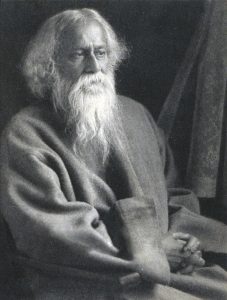
Kobi Guru Rabindranath Tagore
(7 May 1861 – 7 August 1941)
Kobi Guru Rabindranath Tagore reshaped the Bengali literature and music, as well as Indian art with Contextual Modernism in the late 19th and early 20th centuries.
যদি তোর ডাক শুনে কেউ না আসে তবে একলা চলো রে।
একলা চলো, একলা চলো, একলা চলো, একলা চলো রে॥
যদি কেউ কথা না কয়, ওরে ও অভাগা,
যদি সবাই থাকে মুখ ফিরায়ে সবাই করে ভয়—
তবে পরান খুলে
ও তুই মুখ ফুটে তোর মনের কথা একলা বলো রে॥
যদি সবাই ফিরে যায়, ওরে ওরে ও অভাগা,
যদি গহন পথে যাবার কালে কেউ ফিরে না চায়—
তবে পথের কাঁটা
ও তুই রক্তমাখা চরণতলে একলা দলো রে॥
যদি আলো না ধরে, ওরে ওরে ও অভাগা,
যদি ঝড়-বাদলে আঁধার রাতে দুয়ার দেয় ঘরে-
তবে বজ্রানলে
আপন বুকের পাঁজর জ্বালিয়ে নিয়ে একলা জ্বলো রে।।
Swami Vivekananda
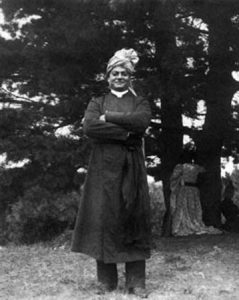
Swami Vivekananda
(12 January 1863 – 4 July 1902)
Swami Vivekananda, born Narendranath Datta was a major force in the revival of Hinduism. Swami Vivekananda summarised the Vedanta as follows, giving it a modern and Universalistic interpretation: Each soul is potentially divine. The goal is to manifest this Divinity within by controlling nature, external and internal. Do this either by work, or worship, or mental discipline, or philosophy—by one, or more, or all of these—and be free. This is the whole of religion. Doctrines, or dogmas, or rituals, or books, or temples, or forms, are but secondary details.
Rishi Aurobindo Ghose
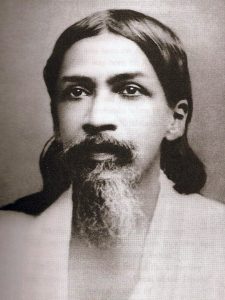
Rishi Aurobindo Ghose
15 August 1872 – 5 December 1950
Rishi Aurobindo Ghose, Rishi Aurobindo Ghose developed a method of spiritual practice – Integral Yoga. The central theme of his vision was the evolution of human life into a divine life. His works include philosophy, poetry, translations and commentaries on the Vedas, Upanishads and the Bhagavad Gita. He was nominated for the Nobel Prize in Literature in 1943 and for the Nobel Peace Prize in 1950.
Doctorji Keshav Baliram Hedgewar
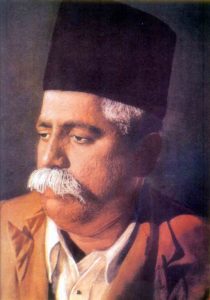
Dr. Keshav Baliram Hedgewar
(1 April 1889 – 21 June 1940)
Dr. Keshav Baliram Hedgewar was the founding Sarsanghachalak of the Rashtriya Swayamsevak Sangh (RSS). Dr. Hedgewar founded the RSS in Nagpur in 1925 on the day of Vijayadashami with an aim to organise Hindu community for its cultural and spiritual regeneration and make it a tool in getting the country free from foreign domination.
Netaji Subhas Chandra Bose
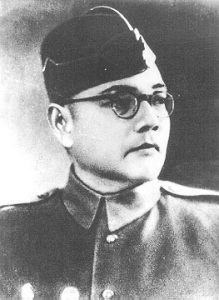
Netaji Subhas Chandra Bose
(23 January 1897 – )
Ārzī Hukūmat-e-Āzād Hind was Bharatiya provisional government established on 21 October 1943 in occupied Singapore in 1943 and supported by Japan and by Nazi Germany. Netaji Subhas Chandra Bose was the leader of the government and the Head of State. Netaji advocated complete unconditional independence for Bharat, whereas the All-India Congress Committee wanted it in phases, through Dominion status. Later, at the historic Lahore Congress convention, the Congress adopted Purna Swaraj (complete independence) as its motto.
His most famous slogan was “Give me blood and I will give you freedom”. Jai Hind, or, “Glory to Bharat!” was another slogan used by him and later adopted by the Government of Bharat and the Armed Forces.
Mystery of his sad demise is yet to reveal.